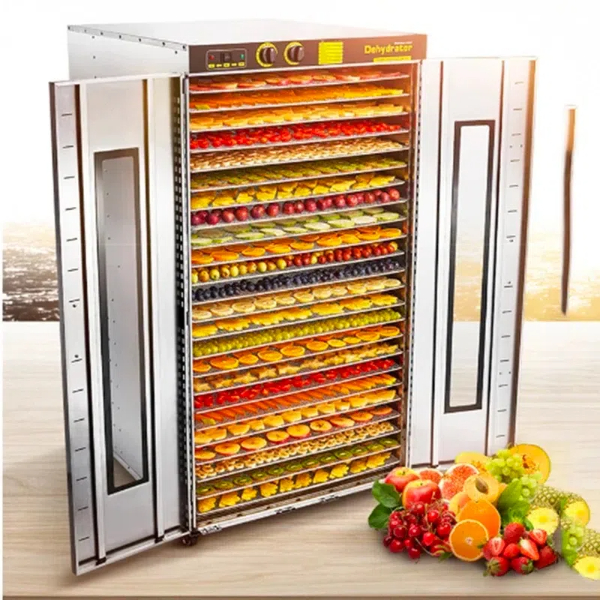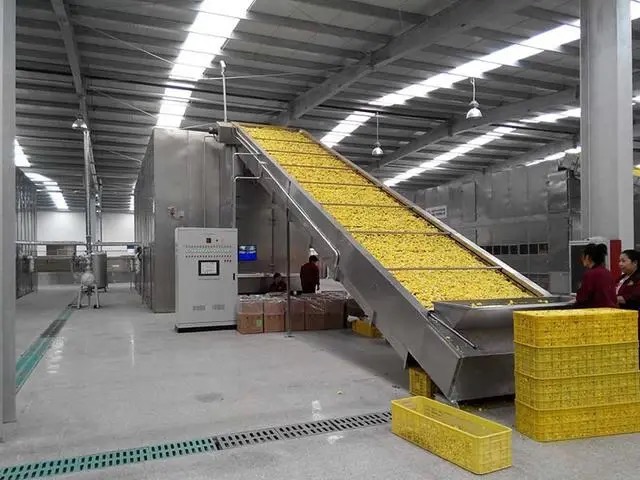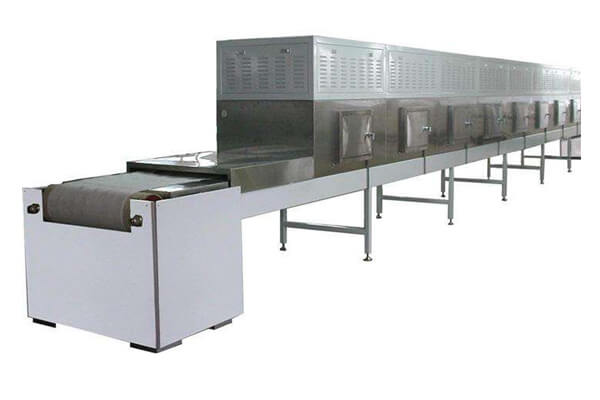
Content Menu
● Introduction to Food Drying Machine Manufacturers
● The Growing Importance of Food Dehydration
>> Why Food Drying Machines Are Essential
● Key Players in the Food Drying Machine Manufacturing Industry
● Innovations and Trends Shaping the Industry
>> 1. Energy Efficiency and Sustainability
>> 2. Smart Technology Integration
>> 3. Hybrid and Multi-functional Drying Systems
>> 4. Customization and Flexibility
>> 5. Compact and Portable Solutions
● The Impact of Food Drying Machine Innovations on the Food Industry
● Challenges Facing Food Drying Machine Manufacturers
● The Future of Food Drying Machine Manufacturing
● Conclusion
● Frequently Asked Questions
>> 1. What are the main types of food drying machines available in the market?
>> 2. How do energy-efficient food drying machines benefit manufacturers?
>> 3. What factors should be considered when choosing a food drying machine?
>> 4. How has the COVID-19 pandemic affected the food drying machine manufacturing industry?
>> 5. What are some emerging technologies in food drying that manufacturers are exploring?
Introduction to Food Drying Machine Manufacturers
In the ever-evolving landscape of food processing and preservation, food drying machine manufacturers play a pivotal role in shaping the industry's future. These innovative companies are at the forefront of developing technologies that not only extend the shelf life of food products but also preserve their nutritional value and enhance their flavor profiles. As we delve into the world of food drying machine manufacturers, we'll explore the latest trends, innovations, and the impact they're having on the global food industry.
The Growing Importance of Food Dehydration
Food dehydration has been a preservation method for centuries, but modern technology has revolutionized this ancient practice. Today's food drying machines are a far cry from the simple sun-drying techniques of the past. They offer precision, efficiency, and consistency that are crucial for commercial food production.

Why Food Drying Machines Are Essential
1. Extended Shelf Life: By removing moisture, these machines significantly extend the shelf life of various food products.
2. Nutritional Preservation: Modern drying techniques help retain more nutrients compared to other preservation methods.
3. Flavor Concentration: Dehydration can intensify flavors, making dried foods a popular choice for snacks and ingredients.
4. Space and Weight Reduction: Dried foods are lighter and take up less space, reducing transportation and storage costs.
5. Year-round Availability: Seasonal fruits and vegetables can be enjoyed throughout the year.
Key Players in the Food Drying Machine Manufacturing Industry
The food drying machine market is populated by a diverse range of manufacturers, from large multinational corporations to specialized small and medium-sized enterprises. Some of the leading players include:
1. Bühler Group
2. GEA Group
3. Tetra Pak
4. SPX FLOW
5. FAVA
6. Nyle Systems
7. CPM Wolverine Proctor
8. Bucher Unipektin AG
These manufacturers offer a wide array of food drying solutions, catering to different scales of production and types of food products.
Innovations and Trends Shaping the Industry
1. Energy Efficiency and Sustainability
One of the most significant trends in food drying machine manufacturing is the focus on energy efficiency and sustainability. Manufacturers are developing machines that consume less energy while maintaining or even improving drying efficiency. This not only reduces operational costs for food producers but also aligns with global efforts to reduce carbon footprints.
2. Smart Technology Integration
The integration of smart technologies and IoT (Internet of Things) capabilities is revolutionizing food drying machines. These advanced systems allow for:
- Real-time monitoring of drying processes
- Remote operation and control
- Predictive maintenance
- Data analytics for process optimization
3. Hybrid and Multi-functional Drying Systems
Innovative manufacturers are developing hybrid drying systems that combine different drying technologies. For instance, a machine might incorporate both freeze-drying and air-drying capabilities, allowing for more versatile food processing options.
4. Customization and Flexibility
As the demand for specialized food products grows, manufacturers are designing more flexible and customizable drying machines. These systems can be easily adjusted to handle a variety of food products with different drying requirements.
5. Compact and Portable Solutions
There's a growing market for smaller, more portable food drying machines. These are particularly popular among small-scale producers, artisanal food makers, and even home users looking to preserve their own produce.

The Impact of Food Drying Machine Innovations on the Food Industry
The advancements in food drying technology are having far-reaching effects on the food industry:
1. Improved Product Quality: Modern drying techniques preserve more of the food's original color, texture, and nutritional value.
2. Expanded Product Range: New drying technologies enable the creation of innovative dried food products, expanding consumer choices.
3. Increased Efficiency: Faster, more efficient drying processes lead to higher production capacities and reduced costs.
4. Enhanced Food Safety: Advanced drying machines offer better control over the drying environment, reducing the risk of contamination.
Challenges Facing Food Drying Machine Manufacturers
Despite the promising advancements, manufacturers face several challenges:
1. High Initial Costs: Advanced drying technologies often come with significant upfront investments.
2. Regulatory Compliance: Manufacturers must ensure their machines meet stringent food safety regulations across different markets.
3. Balancing Efficiency and Quality: Achieving faster drying times without compromising food quality remains a constant challenge.
4. Adapting to Diverse Food Products: Designing machines that can effectively dry a wide range of food items with different properties.
The Future of Food Drying Machine Manufacturing
Looking ahead, the future of food drying machine manufacturing appears bright and full of potential:
1. Artificial Intelligence Integration: AI could revolutionize drying processes by optimizing parameters in real-time based on the specific characteristics of each batch of food.
2. Nanotechnology: The use of nanomaterials in drying surfaces could enhance heat transfer and improve overall efficiency.
3. Sustainable Materials: Manufacturers are likely to explore more eco-friendly materials in machine construction.
4. Personalization: We may see the development of small-scale, highly customizable drying machines for personalized food preservation.
Conclusion
The world of food drying machine manufacturing is dynamic and ever-evolving. As consumer demands shift towards healthier, more sustainable food options, and as technology continues to advance, we can expect to see even more innovative solutions emerging from this industry. Food drying machine manufacturers are not just creating equipment; they're shaping the future of food preservation and processing.

Frequently Asked Questions
1. What are the main types of food drying machines available in the market?
Answer: The main types of food drying machines include:
- Spray dryers
- Freeze dryers
- Drum dryers
- Fluidized bed dryers
- Tray dryers
Each type is suited for different food products and production scales.
2. How do energy-efficient food drying machines benefit manufacturers?
Answer: Energy-efficient food drying machines offer several benefits:
- Reduced operational costs
- Lower carbon footprint
- Improved sustainability credentials
- Potential for government incentives or rebates
- Better alignment with corporate sustainability goals
3. What factors should be considered when choosing a food drying machine?
Answer: Key factors to consider include:
- Type of food product to be dried
- Required production capacity
- Available space
- Energy efficiency
- Initial cost and return on investment
- Maintenance requirements
- Compliance with food safety regulations
4. How has the COVID-19 pandemic affected the food drying machine manufacturing industry?
Answer: The pandemic has:
- Increased demand for shelf-stable foods, boosting the need for drying equipment
- Accelerated the adoption of automation and remote monitoring capabilities
- Highlighted the importance of food safety, leading to innovations in sanitation features
- Disrupted supply chains, prompting manufacturers to seek more localized solutions
5. What are some emerging technologies in food drying that manufacturers are exploring?
Answer: Emerging technologies include:
- Microwave vacuum drying
- Ultrasound-assisted drying
- Pulse electric field drying
- Refractance window drying
- Superheated steam drying
These technologies aim to improve drying efficiency, product quality, and energy consumption.This comprehensive article provides an in-depth look at the world of food drying machine manufacturers, covering current trends, innovations, challenges, and future prospects. The inclusion of relevant images would further enhance the reader's understanding of the topic.












